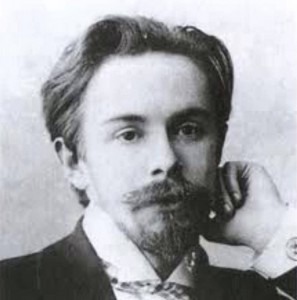 During his lifetime, Scriabin was primarily known as a pianist, with Igor Stravinsky marveling at his phenomenal playing. Yet Scriabin also had the uncanny talent of making enemies, including his composition teachers. Sergei Taneyev was not impressed, and Anton Arensky failed Scriabin in his examinations. And Rimsky Korsakov found Scriabin to be “self-opinionated, warped, strange and distorted.” He showed serious mental instability during the early stages of his life, and eventually believed that the world could only be saved through his art. He certainly had vivid hallucinations, and saw the end of the world culminating in a grandiose sexual orgy. Vladimir Ashkenazy has lauded Scriabin’s greatness and suggested that the composer can only be understood in his homeland, with pianist Vassili Safonov calling him “Russia’s Chopin.”
During his lifetime, Scriabin was primarily known as a pianist, with Igor Stravinsky marveling at his phenomenal playing. Yet Scriabin also had the uncanny talent of making enemies, including his composition teachers. Sergei Taneyev was not impressed, and Anton Arensky failed Scriabin in his examinations. And Rimsky Korsakov found Scriabin to be “self-opinionated, warped, strange and distorted.” He showed serious mental instability during the early stages of his life, and eventually believed that the world could only be saved through his art. He certainly had vivid hallucinations, and saw the end of the world culminating in a grandiose sexual orgy. Vladimir Ashkenazy has lauded Scriabin’s greatness and suggested that the composer can only be understood in his homeland, with pianist Vassili Safonov calling him “Russia’s Chopin.”
Abrasive and narcissistic personality aside, Scriabin had a unique and rather unusual compositional voice. At the tender age of 24, Scriabin needed a vehicle to simultaneously show off his skills as a composer and performer. The natural choice was a piano concerto, and the composer supposedly penned the F sharp minor concerto, Op. 20, in a matter of days during the autumn of 1896. It still took several months before the work was fully orchestrated, and Scriabin premiered the work on 23 October 1897. His only true concerto and one of his earliest works to involve a full orchestra, it combines spectacular virtuosity with an abundance of melodic ideas, rich orchestral colors and harmonic diversity. At this early stage of his musical development Scriabin leaned heavily on Chopin, in both his poetic pianism and orchestral mannerisms. The highly emotional outer movements bracket an introvert and poetic slow movement whose lyrical theme is subjected to four contrasting variations. When Scriabin published his Piano Concerto in F sharp minor, Op. 20, the famous pianist Alexander Glazunov once said, “this piece proves without the shadow of a doubt that Scriabin has lost his mind,” to which Rachmaninoff supposedly replied, “He never had a mind to loose!” Sounds like there is a bit of jealousy in play in this rather harsh assessment, don’t you think?
Alexander Scriabin: Piano Concerto in F-Sharp Minor, Op. 20
You May Also Like
- Unsung Concertos
Jacques Ibert: Flute Concerto If you think that all classical music has to be deadly serious, let me introduce you to Jacques Ibert (1890-1962). Ibert was a graduate from the Paris Conservatoire. - Unsung Concertos
Johann Matthias Sperger: Horn Concerto in E flat Throughout the 18th and 19th centuries, the city of Vienna acted like a gigantic magnet for composers and musicians. - Unsung Concertos
Alessandro Marcello: Concerto for Oboe in D minor Alessandro Marcello (1673-1747) lived a rather charmed life! - Unsung Concertos
Darius Milhaud: Concerto for Marimba and Vibraphone Darius Milhaud grew up in a Latin-Mediterranean cultural milieu that particularly valued Italian music.
More Anecdotes
- Bach Babies in Music
Regina Susanna Bach (1742-1809) Learn about Bach's youngest surviving child - Bach Babies in Music
Johanna Carolina Bach (1737-81) Discover how family and crisis intersected in Bach's world - Bach Babies in Music
Johann Christian Bach (1735-1782) From Soho to the royal court: Johann Christian Bach's London success story - A Tour of Boston, 1924
Vernon Duke’s Homage to Boston Listen to pianist Scott Dunn bring this musical postcard to life
